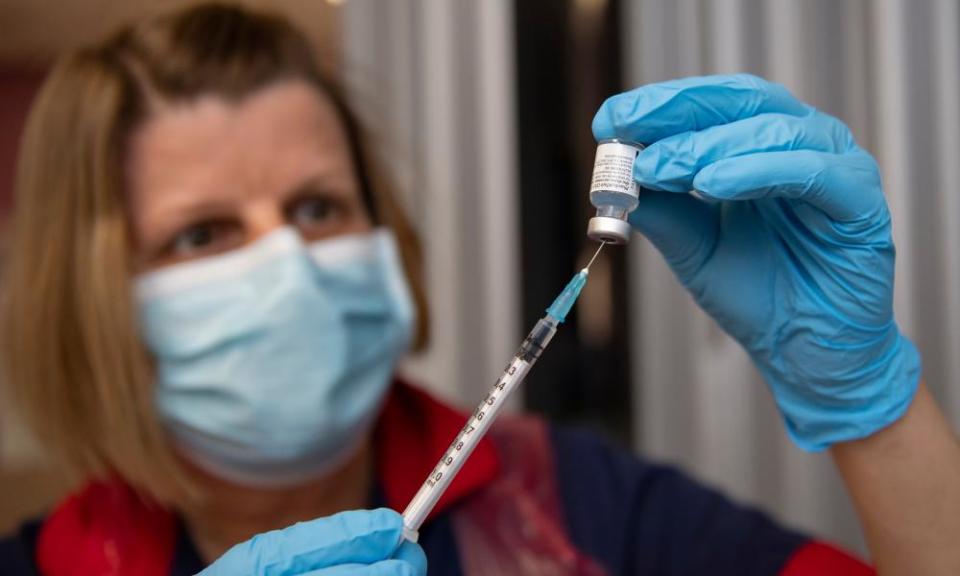North-east and Yorkshire vaccine supply cut to catch up lagging regions

Vaccine supply is to be cut in half in the north-east and Yorkshire next week by the NHS to allow London and other regions lagging behind to catch up in immunising the over 80s.
Official data showed that the north-east and Yorkshire, the leading English NHS region, had given a first dose to two-thirds of its over 80s population – 67% – by 17 January whereas last place London had only treated just under half, at 49.8%.
GP practices in north-east were told to expect 100,000 doses next week, down from 200,000 according to the Health Service Journal, while the health secretary Matt Hancock indicated that supply to the capital will be increased.
Politicians in London have been calling for supply to be urgently stepped up, amid complaints that the NHS’s distribution formula did not take into account the fact that GPs in the capital tended to have larger patient lists.
Ministers want to provide a first dose of either vaccine by 15 February to people in the top four priority groups, who comprise the over-70s, NHS and care workers and people with serious medical conditions.
Hancock told the Commons that while the north-east and Yorkshire region “have gone really fast early on” that “we have to make sure that the vaccination programme is fair everywhere so that everyone in the top four groups can receive that offer of a vaccine by the 15 February”.
Shortly after, London Conservative MP Theresa Villiers called on the minister to “speed up the delivery of vaccines to London”. That prompted the health secretary to add: “We are accelerating the amount of vaccinations in London, which is the region in England that has the most to do.”
The total number of first dose vaccinations supplied as of Wednesday was 4.97m and will have crossed 5m over the course of Thursday. “Let’s all take comfort in the fact we’re giving 200 vaccinations every minute,” said Hancock, who was appearing from home, as he was self-isolating after being alerted by the test-and-trace app this week.
Some backbench Conservatives in the party’s Covid Recovery Group want ministers to start easing the lockdown from 8 March, three weeks after the 15 February deadline, which would allow time for a single dose of a jab to begin to generate antibodies to resist the disease.
But earlier this week, officials in Israel, which has one of the fast inoculation rates in the world, warned that a single dose of the Pfizer vaccine, the one used in the country, appeared “less effective than we had thought”. Thousands of Israelis appear to have become infected after receiving an injection, probably because individuals had not yet built up enough antibody protection.
Wednesday was the second record day in a row for vaccinations, with 363,508 people receiving a jab across the UK. But despite the effort, the figure is a little lower than the 400,000 a day now required to hit the 15 February target, with ministers emphasising they cannot be certain about maintaining supply levels.
Jon Ashworth, the shadow health secretary, said that Boris Johnson had on Thursday referred to constraints in supply and asked: “What are these constraints, what guarantees has he got from manufacturers that they will be resolved, and by when?”
The health secretary acknowledged supply could limit the vaccination programme, and that there was at times “a lumpy supply schedule”. Pfizer has said it is temporarily scaling back production in Europe to upscale its manufacturing plant in Belgium; AstraZeneca said it has supplied on or in excess of 1m doses this week.
The critical fill-finish plant in Wrexham, where the AstraZeneca vaccine is put into glass vials, experienced mild flooding overnight as a consequence of Storm Christoph, but both plants owners and ministers said there was no disruption to manufacturing as a result of the heavy rains.

 Yahoo Finance
Yahoo Finance 